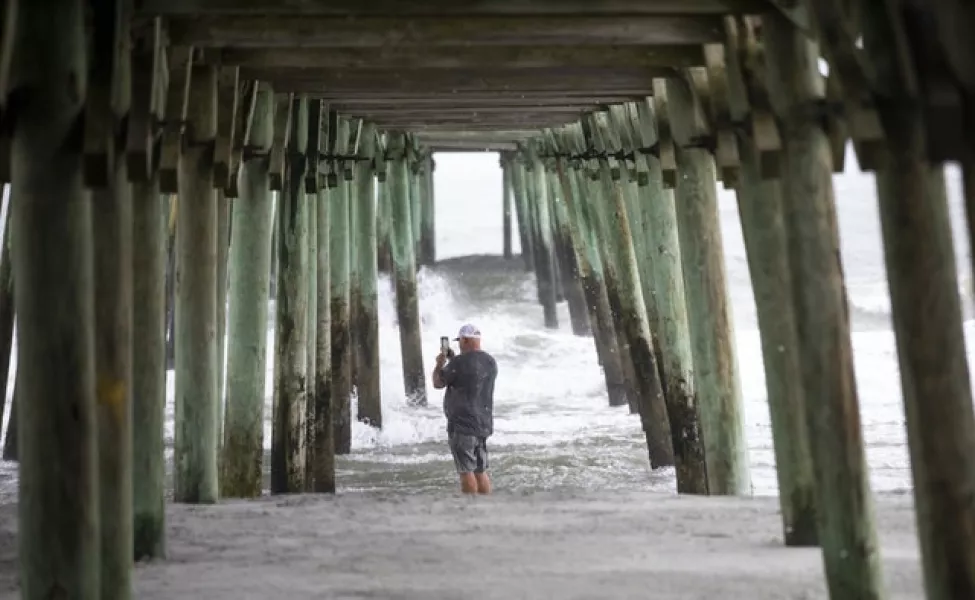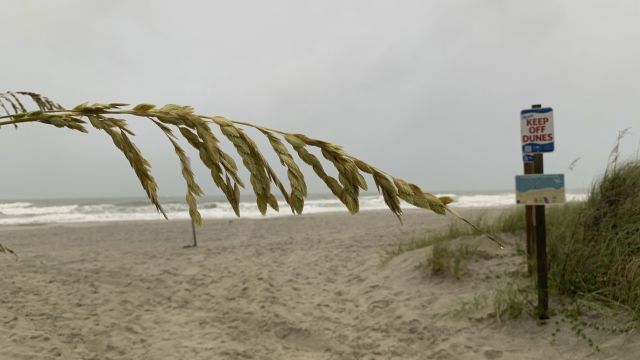The hurricane had touched down just after 11pm local time on Monday with maximum sustained winds of 85mph.
The storm now has maximum sustained winds of 70 miles per hour.
“Now that the centre has moved further inland into east North Carolina, the winds are now coming back down, so it has been downgraded back to a tropical storm,” Robbie Berg, a hurricane specialist with the National Hurricane Centre, said.
The weather service also said in its 4am advisory that threats of tornadoes were beginning to spread into southeastern Virginia.
Tropical storm force winds from #Isaias, with gusts to hurricane force, are expected to spread northward along the Mid-Atlantic coast and into New England today and tonight. These winds could cause downed trees and power outages. https://t.co/8sD0LxJH7C pic.twitter.com/vPvz32decl
Advertisement— National Hurricane Center (@NHC_Atlantic) August 4, 2020
The storm set off flooding and sparked five home fires in Ocean Isle Beach, Debbie Smith, the town’s mayor, told WECT-TV. Firefighters from the town’s fire department were battling the blaze with assistance from Horry County firefighters in South Carolina, Tony Casey, a spokesperson for Horry County Fire Rescue, said.
About 80 miles north of Ocean Isle Beach, about 30 people were displaced due to a fire at a condominium complex in Surf City, news outlets reported.
It is not clear if the fires were connected to the storm.
No injuries have been reported.
The storm could continue to bring down trees and cause power outages as it moves north along the mid-Atlantic and New England coastline, Mr Berg said.
“We don’t think there is going to be a whole lot of weakening, we still think there’s going to be very strong and gusty winds that will affect much of the mid-Atlantic and the Northeast over the next day or two,” Mr Berg said.

Rainfall will continue to be a big issue, he added.
Duke Energy reported hundreds of thousands of power outages as heavy rains and winds battered areas including Wrightsville, Kure, and Carolina beaches in Wilmington, North Carolina.
Coastal shops and restaurants closed early, power began to flicker at oceanfront hotels and even the most adventurous of beachgoers abandoned the sand as newly restrengthened Hurricane Isaias sped toward the Carolinas.
The US National Hurricane Centre warned oceanside home dwellers to brace for storm surge up to five feet and up to eight inches of rain in spots, as Isaias moved up the coast.
The Carolinas were not the only states at risk.
Storm surge warnings and watches remain in effect for portions of the North Carolina coast, where #Isaias could produce as much as 3-5 ft of flooding above ground level. 1-3 ft is expected farther north from Virginia to southeastern Massachusetts. https://t.co/gjqRQhRrj1 pic.twitter.com/omfpY54Oqk
— National Hurricane Center (@NHC_Atlantic) August 4, 2020
“All those rains could produce flash flooding across portions of the eastern Carolinas and mid-Atlantic, and even in the northeast US,” said Daniel Brown, senior hurricane specialist at the US National Hurricane Centre.
A tropical storm warning extended all the way up to Maine, where flash flooding was possible in some areas on Wednesday.
The centre also warned of possible tornadoes in North Carolina early on Tuesday, and from eastern Virginia to southern New England later on Tuesday.
Isaias was upgraded again from a tropical storm to a category one hurricane on Monday evening.
Early Tuesday the storm, downgraded again, was centred about 25 miles northwest of Greenville, North Carolina.
It was moving quickly north northeast over eastern North Carolina at 26mph and this general motion accompanied by an increase in forward speed is expected through until Tuesday.
Isaias killed two people in the Caribbean and roughed up the Bahamas but remained at sea as it brushed past Florida over the weekend, providing some welcome relief to emergency managers who had to accommodate mask-wearing evacuees in storm shelters.







